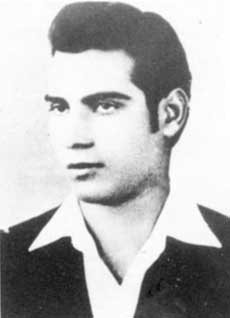Evagoras Pallikarides facts for kids
Quick facts for kids
Evagoras Pallikarides
|
|
|---|---|
| Ευαγόρας Παλληκαρίδης | |
 |
|
| Born | 26 February 1938 Tsada, British Cyprus
|
| Died | 14 March 1957 (aged 19) Nicosia Prison, Nicosia, British Cyprus
|
| Cause of death | Execution by hanging |
| Nationality | Greek |
| Occupation | Poet |
Evagoras Pallikarides (Ευαγόρας Παλληκαρίδης; 26 February 1938 – 14 March 1957) was a young Greek-Cypriot poet and a brave freedom fighter. He was a member of a group called EOKA, which worked to end British rule in Cyprus between 1955 and 1959.
Evagoras was arrested on December 18, 1956. He was found with weapons, like a machine gun and ammunition, which he admitted to having during his trial. On February 27, 1957, he was sentenced to a very serious punishment for having these weapons. He was the youngest person from the EOKA group to face such a penalty in Cyprus. Many people were upset about his death because he was so young and because of how he was arrested.
Contents
Evagoras Pallikarides: A Young Hero
His Early Life
Evagoras Pallikarides was born in the village of Tsada in Paphos, Cyprus. He was the youngest of four children in a family of farmers.
Standing Up for Cyprus
Protests and Arrests
In March and April 1953, people in Cyprus were getting ready for Queen Elizabeth II's coronation. British flags were put up in Paphos, which made many locals angry. They organized protests, which were mostly peaceful.
However, on April 1, 1953, at a school protest, 15-year-old Evagoras climbed a flagpole. He took down the British flag and tore it with his friends. This act sparked more protests across Paphos. The police were told not to get involved to avoid violence during the coronation celebrations. Evagoras was arrested but later set free. No public celebrations for the Queen's coronation happened in Paphos that June.
Joining the EOKA Movement
When he was 17, Evagoras joined EOKA as a junior member. EOKA was a group fighting for Cyprus to become independent from British rule.
On November 17, 1955, he took part in a student protest. This protest was meant to distract authorities for an EOKA operation, but the operation didn't happen. Evagoras was arrested and accused of causing public disorder, but he said he didn't do it. His trial was put off until December.
His Final Stand
The Arrest and Trial
On December 18, 1956, Evagoras and two older EOKA members were moving weapons for an upcoming mission. They came across a British patrol. The two adults managed to get away, but Evagoras was caught.
During the investigation, it was found that he had been in trouble with the authorities twice before. He was officially accused of being part of EOKA and carrying illegal weapons. During his trial on February 25, he bravely admitted what he had done. He said, "I know you will sentence me to death, but whatever I did, I did as a Cypriot who wants his liberty."
Efforts to Save Him
The day after his trial, students from Paphos High School stopped attending classes. They asked the British Governor, John Harding, to forgive Evagoras. News reached the Greek government, which immediately tried to help Evagoras.
Representatives from the Greek Parliament sent messages to the House of Lords in Britain and the United Nations. People and church groups in Cyprus also asked the Queen to step in. Even a US Senator, Fulton, tried to help. However, the Queen and Governor Harding refused to pardon Evagoras.
His Death and Burial
Evagoras was put to death on March 14, 1957. British authorities buried him in a special graveyard inside the Nicosia prison. This was done to prevent his funeral from causing more public unrest. This graveyard is known as the "Imprisoned Marbles."
Remembering Evagoras
Evagoras remains the youngest EOKA fighter to be put to death by the British government. He was also the last fighter to face such a penalty in Cyprus. His death, just before Cyprus gained its freedom, is seen as a sad event in Cyprus's history. It still affects Cyprus's relationship with the British Crown. Many people believe the Crown could have prevented these tragedies but chose not to.
When Queen Elizabeth II visited Cyprus in 1993, some protestors booed her. They told her to "go home." Protestors waved Cypriot flags with black ribbons to remember the fighters who lost their lives. Some relatives of the executed fighters even built a fake gallows in the main city square. They handed out leaflets with Elizabeth's picture, saying "wanted for killing of freedom fighters."
A football club called Evagoras Paphos was named after him after Cyprus became independent in 1960. This club later joined with another to become AEP Paphos. Today, the football club Pafos FC has an image of Evagoras's face on its club badge, honoring his memory.
Images for kids
 | James B. Knighten |
 | Azellia White |
 | Willa Brown |


